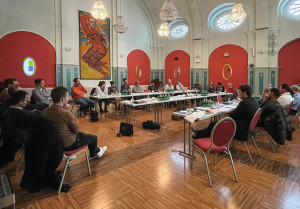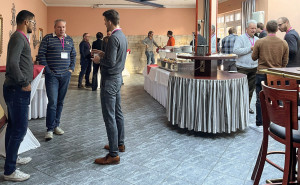The event of the atmospheric pressure plasma user group (ak-adp) on 9-10 November 2022 with several renowned experts focused on "Adhesion optimization - AD plasmas for tailor-made functionalities, sustainable applications & new materials"
The technically simple realization of adhesion optimization through plasma treatment of surfaces is constantly finding new applications for special functionalities on new materials and material combinations. By replacing chemical surface pre-treatments, ecologically sustainable aspects also play an important role in the use of atmospheric plasmas.
Current work from research and industry was presented and discussed at the workshop. After an introduction to the application of atmospheric plasmas for the controlled realization of surface wetting for various requirements, the presentations focused on
- special cleaning, activation and coating processes
- adhesive-free joining
- plasma modification of polymer and stainless steel surfaces
- the question of the durability of plasma pre-treatment
- cold plasma hardening and
- the presentation of new developments and application examples from system manufacturers.
 Discussion round "ak-adp-talk "An important process-related question in plasma treatment for improving adhesion is the question of the durability or shelf life of the plasma treatment. In which time window after the plasma treatment must the further processing of the treated surface take place? In the application example "Plasma activation for robust bonding processes - how long are plasma-activated polymer surfaces open?" presented by Dr. Sergey Stepanov from the Fraunhofer Institute for Manufacturing Technology and Advanced Materials IFAM Bremen, four clear coat systems with different additives were tested for bonding on PP composites. The material samples were stored for up to 28 days after plasma treatment with OpenAir plasma under normal climate and hot and humid conditions. The surface energies and peel strengths were measured before and after storage. After plasma treatment, a significant increase in wettability, i.e. an increase in the polar part of the surface energy in particular, was demonstrated for almost all plasma parameters and material combinations. However, the rule "a lot helps a lot" does not apply - moderate plasma parameters are often the better choice. This was confirmed once again: Higher surface energy values do not necessarily lead to higher adhesive strengths! An increase in peel strength and a decrease in scattering can often be observed with reduced treatment intensities.
Discussion round "ak-adp-talk "An important process-related question in plasma treatment for improving adhesion is the question of the durability or shelf life of the plasma treatment. In which time window after the plasma treatment must the further processing of the treated surface take place? In the application example "Plasma activation for robust bonding processes - how long are plasma-activated polymer surfaces open?" presented by Dr. Sergey Stepanov from the Fraunhofer Institute for Manufacturing Technology and Advanced Materials IFAM Bremen, four clear coat systems with different additives were tested for bonding on PP composites. The material samples were stored for up to 28 days after plasma treatment with OpenAir plasma under normal climate and hot and humid conditions. The surface energies and peel strengths were measured before and after storage. After plasma treatment, a significant increase in wettability, i.e. an increase in the polar part of the surface energy in particular, was demonstrated for almost all plasma parameters and material combinations. However, the rule "a lot helps a lot" does not apply - moderate plasma parameters are often the better choice. This was confirmed once again: Higher surface energy values do not necessarily lead to higher adhesive strengths! An increase in peel strength and a decrease in scattering can often be observed with reduced treatment intensities.
Dr. Marvin Omelan from the Fraunhofer Institute for Surface Engineering and Thin Films IST Braunschweig reported in his presentation on "Adhesive-free joining of homogeneous and heterogeneous material composites via AD plasma" on his work with plasma systems developed in-house. The low-temperature joining of plastics makes it possible, for example, to separate materials by type as a basis for recycling processes. Thanks to thin-film plasma coating in pulse-pause mode and a static thermobonder, delayed lamination processes of up to 2 m/min can currently be realized. The setting of defined temperatures and humidity levels enables bonding and separating. Further work concerns the saving of process resources such as energy and gas consumption as well as the extension to useful materials such as acetates and recyclates.
Another interesting topic was presented by Dr. Konstantin Livanov from OrelTech GmbH Berlin. With the help of the "cold plasma curing for pure precious metal layers", previously only realized as a vacuum process, structures made of silver, gold, platinum and palladium inks are printed and plasma-cured. This technology, which is interesting for the production of electrically conductive structures, for example, should also be feasible with atmospheric plasmas in the future.
 Break talksAnew plasma source, which was developed for direct integration into printing processes, was the focus of the presentation by Dr. Neysha Lobo Ploch from the Ferdinand-Braun-Institut gGmbH Leibniz-Institut für Höchstfrequenztechnik Berlin. The "Ultra-compact atmospheric pressure microwave plasma source for the cost-effective treatment of surfaces" was comprehensively characterized for the functionalization of various plastics with regard to the modification of surface energy and adhesion properties. In addition to the tests for plasma activation of plastics, an antimicrobial effect was also demonstrated.
Break talksAnew plasma source, which was developed for direct integration into printing processes, was the focus of the presentation by Dr. Neysha Lobo Ploch from the Ferdinand-Braun-Institut gGmbH Leibniz-Institut für Höchstfrequenztechnik Berlin. The "Ultra-compact atmospheric pressure microwave plasma source for the cost-effective treatment of surfaces" was comprehensively characterized for the functionalization of various plastics with regard to the modification of surface energy and adhesion properties. In addition to the tests for plasma activation of plastics, an antimicrobial effect was also demonstrated.
The concluding ak-adp-talk offered further opportunities for information and discussion: What is the easiest and most reliable way to measure the adhesion properties of a surface with the composite partner? The provocative question was posed under the focus "Surface energy under cross-examination": Test inks - humbug or quick and inexpensive tool for the practitioner? Competent employees from the analytical equipment manufacturers KRÜSS GmbH Hamburg and Dataphysics Instruments GmbH Filderstadt were welcomed to the event. Both companies have many years of experience in the construction of special devices for measuring surface properties to determine wettability and adhesion. Concrete measurement scenarios, i.e. possibilities of surface analysis for an application-dependent optimal verification of the adhesion properties of material combinations, were presented in keynote speeches, which were then discussed from the perspective of the workshop participants. It emerged that when transferring new developments from research to industry, the focus should be on providing an optimal option for process control and quality assurance. Companies' willingness to innovate can be significantly boosted by inline quality verification that is reliable/unambiguous, fast, non-destructive and cost-effective.
The workshop is regularly used by participants from industry, business-related research and plasma plant engineering as a source of technological inspiration. The opportunity to establish contacts, communicate and exchange information was also the focus of the established evening event and get-together. The workshop was supported by the Deutsche Industrieforschungsgemeinschaft Konrad Zuse e.V. Berlin.
Preview: Invitation to the Industry Dialogue for Sustainability
Innovative industry-relevant possibilities of surface functionalization will be offered. Plasma technology can be learned about in best practice examples on April 26 and 27, 2023 at the Grassimuseum Leipzig at the 43rd workshop of the user group atmospheric pressure plasma ak-adp. The thematic focus of the workshop is on specific industrially implemented plasma applications, ongoing applied research topics and plasma system developments as well as possibilities for thin-film analysis during production. A highlight of the workshop is the evaluation of the #ZukunftADP competition.


